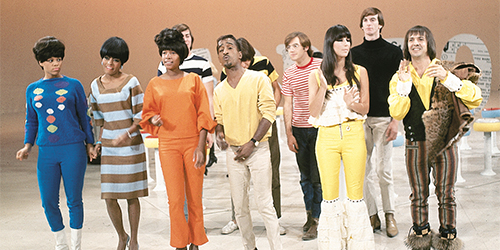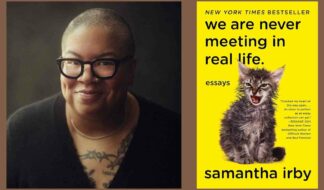
"I'm wondering, well, why wasn't Martha Reeves mentioned?" says Martha Reeves.
Holding up the marquee from the "Motown 25" box set, a baffled Reeves doesn't know the reason she and other Motown greats – Mary Wells and Junior Walker, for instance – got shafted, but she's not letting that get in the way of today's appearance at Detroit Public Television in Wixom, Mich., where she and Mary Wilson of the Supremes are appearing in-studio for the TV special's re-broadcasting at 8 p.m. Feb. 28 on WTVS.
The original "Motown 25" special premiered May 16, 1983 on NBC to commemorate the 25th anniversary of Motown. It was during this broadcast that Michael Jackson debuted the moonwalk, Smokey Robinson reunited with the Miracles, and the Four Tops duked it out with the Temptations in a fun-spirited battle of the bands contest. Reeves, without her Vandellas, belted out 30 seconds of one of her group's biggest hits, "Heat Wave," while Wells sang "My Guy." "Motown 25" became one of the most buzzed-about concerts to ever air on TV.
"I guess we're the 'surprise others,'" Reeves says bitingly, referencing the box set's promised features. "So – surprise!"
Less surprising is Reeves and Wilson's place on the metaphorical marquee of LGBT icons, where their legacies are etched into the rainbow fabric of our lives. From the studio, the two Motown legends talked about Motown's "inclusivity," their respective gay followings and the drag queens who are carrying on their legacies.
30 YEARS LATER
Martha Reeves: Do you know how exciting it is to be talking about something 30 years old?!
Mary Wilson: Even though it's been 30 years, when it's as phenomenal as Motown was, it's one of those things that's with you forever. The time isn't even an element. It's timeless. It's hard to say it was 30 years ago!
GAYS & GLAM
Wilson: I didn't know anything about that. (Being gay) was a new phenomenon that hadn't been exposed. It wasn't something in the mindset that you thought about. In fact, I don't think there was a moment when I realized that because it was just so early and it was (a) very inclusive (time). (Men) weren't coming out. The gays didn't come and you'd say, "Oh, those are gay people!" We didn't have that. The realization (hit the Supremes) when we started doing TV shows and a lot of the guys who would design gowns for us were gay, and they would bring all those gorgeous design sketches and we looked like little Barbie dolls – three little Barbie dolls – and so that's when we realized there was something about that that was different from the way you were normally perceived, because they saw us as these glamorous, gorgeous Barbie dolls – black Barbie dolls!
THE SUPREMES
Wilson: We came around at the right time in American history. All these other people inspired us, and then, in the '60s during the civil rights movement and women's liberation, we happened to be right there. We were there at the right time. We had a chance to really accomplish more because the world was changing and we were right there.
ARE THE SUPREMES EVER GETTING BACK TOGETHER?
Wilson: I wouldn't say that I'm sick of hearing about it. It's a question that comes up at every interview. I've done interviews thousands and thousands of times, and it always comes up.
Whenever, and if, Diana's ready, then something like that could happen. She would have to be the one to say she's ready. Right now she's not ready. You should write about this… Diana and I are sisters from the soul, period. You know, you have a lot of things in life that interfere with your feelings, and that has happened with us. It's just life situations. Life's business. Life's all those things that are in the middle of our friendship. Our friendship is still our friendship. It's all this other crap that's in the middle of it. I don't even know how it started or where it came from, but it's all professional.
THE QUEENS
Reeves: They have a revue here (in Detroit) at a club, and I went and saw some guy. And oh god! He kept pulling up his clothes – nothing I'd ever do! He was doing his man thing, honey. I don't have a man thing. Never put on men's clothes to try to be a guy, that's for sure. He was doing his female thing too, but it wasn't necessarily Martha Reeves. It's like seeing Linda Ronstadt sing "Heat Wave," or like seeing Marvin Gaye sing "Dancing in the Street" where he looks over and sees me in the corner admiring him. (Both songs were originally recorded by Martha and the Vandellas.)
Wilson: Oscar Huckabee was one of the biggest drag queens in Detroit at the time. We did a lot of shows in Detroit, and Oscar Huckabee – he wasn't called a drag queen at the time that I know of, but he was at all of the shows and would always do these exotic dances. He was always dressed in exotic kinds of things. He was exquisite. Just wonderful. I guess you would call him a drag queen today. He was a very important figure in those days. He was a dancer – an exotic dancer – and boy was he great. For sure he was not straight! (Laughs)
UPCOMING PROJECTS
Reeves: After Motown, the third company I went to was Arista – Clive Davis. I've been recording all along – I just didn't have distribution or promotion – but they just found a 30-year-old album and released it again and it's online right now entitled "The Rest of My Life."
Wilson: I have new recordings that are coming out, and hopefully soon! Next couple of months. We've been working on it for 12 years. I'm feeling like Stevie Wonder! When is this great project coming out?! So that's how I feel. I have my gown exhibit – the Supremes gowns – which are still touring, and I'm hoping to set up a place in Las Vegas – an exhibit – with all of my Supremes gowns.
THE SOUND OF YOUNG AMERICA
Wilson: The music was inclusive. It didn't matter who you were, the music touched your soul. Music, to me, brought all the souls together. I've always said that Motown was an ambassador for love and for friendship because it brought people together. Music does that anyway, but Motown as a whole was an entity that really brought people together.
Reeves: I think gay people came out of the closet mainly for racial reasons, because if you can accept somebody being gay then you can accept somebody being black. Gay people fit right in with us. It was no big deal. Nobody was special. Nobody was different … until they became musical or started dancing, and then they wanted to show off their artistry. The flower movement – the flower children – were trying to tell you, "Accept us for who we are. We all love in music, 'Flower Power' and LSD – everything." Everybody got high. Everybody went wild. Everybody came out.
It's a free world now. We're all free. "Dancing in the Street" was to allow people to block the streets off with the police forces and yellow tape, come out of their house and dance without fear of getting hit by a truck, a train, or a car or an airplane. It's about freedom. It's about being who you are, and being free to be who you are … without anybody beating you up!
There's no difference to me. It's all about being who you are and living the way you want to live. That's America. That's the freedom that we learned as Motown artists. That's the way Motown was – free. The "Sound of Young America." And that's everybody.











